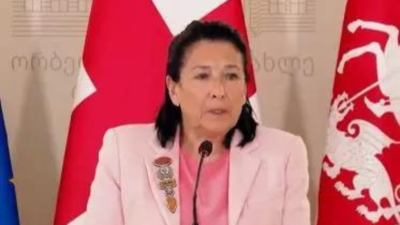- News
- World News
- Rest of World News
- Georgia president vetoes controversial 'foreign influence' law
Trending
Georgia president vetoes controversial 'foreign influence' law

TBILISI: Georgian President Salome Zurabishvili on Saturday put a mostly symbolic veto on the "foreign influence" law which has sparked unprecedented protests and warnings from Brussels that the measure would undermine Tbilisi's EU aspirations.
Ruling Georgian Dream party lawmakers voted through the legislation this week in defiance of protesters concerned the ex-Soviet republic is shifting away from a pro-Western course back toward Russia.
The move has sparked a wave of protests unprecedented in the recent history of the Black Sea nation.
"Today I set a veto... on the law, which is Russian in its essence, and which contradicts our constitution," Zurabishvili said in a televised statement on the measure Saturday.
The bill has sparked a wave of protests unprecedented in the recent history of the Black Sea nation. Its critics say it resembles Russian legislation used to silence dissent.
According to opinion polls, more than 80 percent of the population wants to join the European Union and NATO, and is staunchly anti-Kremlin.
- Warnings from EU -
Brussels on Saturday repeated its warnings that the measure is incompatible with Georgia's bid for EU membership, which is enshrined in the country's constitution.
European Council chief Charles Michel on Saturday posted on X, formerly Twitter, that the president's veto offered "a moment for further reflection".
He called on lawmakers to "make good use of this window of opportunity" to keep Georgia on its EU path.
Prime Minister Irakli Kobakhidze has signalled his party's readiness to consider Zurabishvili's proposed amendments to the law, should she lay them out in her veto document.
But the figurehead president -- at loggerheads with the ruling party -- has ruled out the prospect of entering "false, artificial, misleading negotiations" with Georgian Dream.
The bill requires NGOs and media outlets that receive more than 20 percent of their funding from abroad to register as bodies "pursuing the interests of a foreign power."
In an interview published in France's La Tribune Dimanche paper, Zurabishvili, herself a former French diplomat, called on President Emmanuel Macron to come to Georgia to back their cause.
"I wrote to President Macron, I am expecting him for Georgia's independence day, May 26," she said.
"It is not only Georgia that is at stake, it is a question of definitively extricating the Caucasus from the mentalities of the Soviet yoke and Russian influence," Zurabishvili told the paper.
Ruling Georgian Dream party lawmakers voted through the legislation this week in defiance of protesters concerned the ex-Soviet republic is shifting away from a pro-Western course back toward Russia.
The move has sparked a wave of protests unprecedented in the recent history of the Black Sea nation.
"Today I set a veto... on the law, which is Russian in its essence, and which contradicts our constitution," Zurabishvili said in a televised statement on the measure Saturday.
However the Georgian Dream party has enough lawmakers in parliament to override the veto.
The bill has sparked a wave of protests unprecedented in the recent history of the Black Sea nation. Its critics say it resembles Russian legislation used to silence dissent.
According to opinion polls, more than 80 percent of the population wants to join the European Union and NATO, and is staunchly anti-Kremlin.
- Warnings from EU -
Brussels on Saturday repeated its warnings that the measure is incompatible with Georgia's bid for EU membership, which is enshrined in the country's constitution.
European Council chief Charles Michel on Saturday posted on X, formerly Twitter, that the president's veto offered "a moment for further reflection".
He called on lawmakers to "make good use of this window of opportunity" to keep Georgia on its EU path.
Prime Minister Irakli Kobakhidze has signalled his party's readiness to consider Zurabishvili's proposed amendments to the law, should she lay them out in her veto document.
But the figurehead president -- at loggerheads with the ruling party -- has ruled out the prospect of entering "false, artificial, misleading negotiations" with Georgian Dream.
The bill requires NGOs and media outlets that receive more than 20 percent of their funding from abroad to register as bodies "pursuing the interests of a foreign power."
In an interview published in France's La Tribune Dimanche paper, Zurabishvili, herself a former French diplomat, called on President Emmanuel Macron to come to Georgia to back their cause.
"I wrote to President Macron, I am expecting him for Georgia's independence day, May 26," she said.
"It is not only Georgia that is at stake, it is a question of definitively extricating the Caucasus from the mentalities of the Soviet yoke and Russian influence," Zurabishvili told the paper.
End of Article
FOLLOW US ON SOCIAL MEDIA










